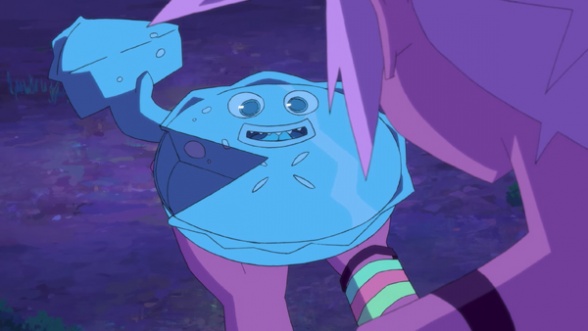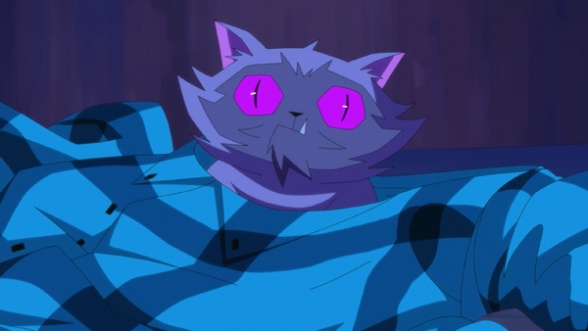Welcome back to Multiversity Comics’ Kipo and the Age of Wonderbeasts reviews. This week H.M.U.F.A.’s going better than ever, which is great to see, but Kipo’s got a lot to deal with since her friends have been captured by Dr. Emilia who has now developed a “cure” for the mutes—yeah, a term that strongly implies that she sees mutes as a disease. This episode has a lot of great stuff going on, but the darker themes of Kipo and the Age of Wonderbeasts are really coming to the fore in this episode and after this there’s no going back.

“Don’t You Forget A-Meow Me”
Written by Taylor Chapulin Orci
Directed by Bridget Underwood
1. Brain bath time
Purely in terms of animation, having Mulholland on screen is always a treat. His shape-shifting ways open up different avenues for the animators to convey story, and they absolutely relish this. (Mulholland pie eating a slice of pie and to become a full pie again was a particularly nice moment.) However, this episode uses Mulholland in an even more interesting way than usual, as “the brain bath,” a way to revisit Emilia’s trap for Kipo and play it over and over again like in that movie, Edge of Tomorrow, or that manga, “All You Need Is Kill.” (Hmm, maybe those two things are related somehow. . .)

The impulse when talking about scenes like this is to talk about them like videogames, and while there are certainly a lot of similarities between videogames and Mulholland’s brain bath, there’s a key difference that makes this way more interesting. When Kipo experiences the brain bath, she’s in the moment—there isn’t the sense of detachment that comes with a videogame. The brain bath simulates not only everything external, but everything internal as well. In a videogame, you can try different things each time, but in the brain bath Kipo can freeze up and do nothing, literally paralyzed with fear.
Kipo replays the scenario to find a way to outsmart the unfolding sequence of events, but more importantly, she replays the scenario to find ways to manage her emotions and adrenaline. This is as much a mental barrier as it is a physical one, and that’s what really makes this plot construct so interesting to explore.
2. Kipo’s anger
In my last review, I pointed out that Kipo was slipping, and again in this episode we see hints of this. As Kipo struggles with the brain bath, she initially latches on to her anger as a solution. As she explains to Yumyan when he tries to express the importance of being brave, “You pushed your fear down, you got steamed, and you did something about it! Look out, Emila, because I’m boiling!” She latches onto the wrong part of what he was saying, and that’s easy to do. After all, anger can be a great motivator, but it also tends to narrow one’s focus. Kipo really needed an open mind to tackle Dr. Emilia’s trap, but by using her anger as a solution only led her to trying different variations of the same thing over and over.

Worse, it meant she wasn’t dealing with the emotional component of the simulation, instead she was pushing it down, and over time it bubbled back up as crippling stress.
3. Scarlemagne and Song
I’ve been impatiently waiting for this interaction since the end of season two. Of Scarlemagne’s two adopted parents, Lio always had the harder time being the optimist. We see time and time again in the flashbacks with him and Song that it’s Song who sees the potential for good and a better future, and she convinces Lio. Don’t get me wrong, Lio is still an optimist—in part I think it’s because he learned to nourish that aspect of himself from Song—but if he doesn’t check his impulses, it’s easy for him to assume the worst, and that’s played a big role in the rift between him and Hugo.
However, the rift between Song and Hugo is more complicated. Through no fault of either of them, they fell out of each others lives, and when they met again, they had been severely changed by circumstances. Song’s a Mega Monkey and Hugo’s embraced an alter-ego called Scarlemagne.
Continued below
Throughout their interactions this episode, Scarlemagne repeated states his disdain for feelings—it’s what sets him apart from Hugo. And I think a big part of that is that he can see the disappointment in Song’s eyes, and he doesn’t want to face the shame he feels for what he’s done. Song never let him down like Lio did, so he can’t dismiss those feelings as easily or bury them under anger, so it’s easier to pretend they don’t exist.
What I love about Song and Scarlemagne interacting is the way she brings out a more empathetic side in him, giving his Hugo persona a bit of a foothold. Song once taught Hugo how to communicate, and it’s nice to reverse that and have Scarlemagne doing the same for Song.

And when this all culminates with the two of them helping Kipo, there’s a moment where Kipo hugs her mom and thanks her, and Scarlemagne watches all this and smiles. He doesn’t insert himself into the moment, he just sits back and enjoys what Kipo and Song have. This has gone beyond empathy—he’s now experiencing confelicity; pleasure in the happiness of others.

And in the end, all he asks for return is a piano. And when I think of what a piano means to Hugo, how he wasn’t able to play it back in his burrow, because it would reveal his true intelligence, it shows the way in which he’s free now. Yes, he’s still in a cage in the end, but that part of him is free. And having Song, listening nearby and loving this side of him, is truly touching.

4. Superiority
This is something that comes up a lot throughout this season, so I’m definitely going to mention it again, but with everything going on in the world at the moment, especially in the U.S.A., this is an element that rings really true. Dr. Emilia believes in the superiority of humans over mutes and she wants the world to go back to the way it was before. It’s no coincidence that she’s the villain of the show and she’s white, and all our human leads fighting alongside the mutes are people of color. In 2020, it makes a lot of sense that the villain of the show is an allegory for white supremacy.

The show isn’t even subtle about it. And nor should it be. Subtlety can be overrated, and given the subject matter, it’s important to make clear statements. Dr. Emilia’s illusion of supremacy over others cuts her off from empathy and it makes her dangerous and cruel. But it’s also her weakness, something Kipo is able to exploit.
5. The cost
This is another element we’re going to see a lot throughout this final season. Dr. Emilia sees herself as a victim who needs to restore the natural order. But in this conflict, it’s not the supremacists that bear the cost of this conflict.
Yamyan, a member of the oppressed class of people, bears the cost here, and it’s infuriating, and heartbreaking, and it’s not fair.

So, what did you think of this episode? Let me know in the comments.






